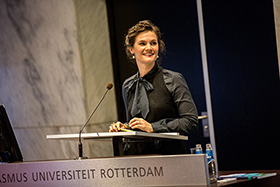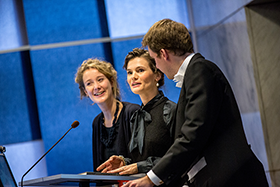PhD Defence: No Team is an Island
Today, many organizations face the problem; their teams –departments, groups, units – operate as separate islands. The modern organization is an archipelago, with teams operating in isolation. This is a problem, because coordination and cooperation between teams is crucial for the performance of the organization as a whole. In her PhD dissertation entitled ‘<link doctoral-programme phd-in-management phd-projects detail>No Team is an Island: an Integrative View of Strategic Consensus between Groups’, Jeanine Porck tackles this important but under-researched phenomenon.
 She focuses on strategic consensus, the shared understanding of the strategy, since this alignment is essential for creating and improving the cooperation between teams. Her studies show how to measure the level of strategic consensus within and between teams, what determines alignment between teams and the positive impact of consensus between teams. In doing so, she extends the current knowledge about teamwork with insights on how to make it work between teams.
She focuses on strategic consensus, the shared understanding of the strategy, since this alignment is essential for creating and improving the cooperation between teams. Her studies show how to measure the level of strategic consensus within and between teams, what determines alignment between teams and the positive impact of consensus between teams. In doing so, she extends the current knowledge about teamwork with insights on how to make it work between teams.
Porck investigated shared strategic understanding in several medium-sized and large companies. To do so, she developed a new and innovative method called Strategic Consensus Mapping (SCM), together with her research group. SCM measures and visualises consensus within and between teams. This improves understanding of how much alignment there is between teams and what it is these teams (dis-)agree on.
Furthermore, Porck’s research demonstrates that when teams are more aligned their cooperation is significantly improved. Additionally, based on three extensive studies, her work provides guidelines on what determines consensus between teams and thereby how to increase alignment between teams within the organization.
Firstly, organisations need to recognize that a strong focus on teams brings with it a risk of dysfunctional relationships among teams; creating shared understanding between groups is difficult if employees identify too strongly with their own team, while strongly identifying with the organization has a positive effect. Secondly it is important to cherish the ‘networkers’; employees that are connected to many others in the organization are found to be an important engine for creating shared understanding between  teams within and outside their own team. Lastly, helping employees build bridges between teams is vital; if employees can easily work with both members of their own and from other teams this strengthens the positive effect of shared consensus between groups on their cooperation.
teams within and outside their own team. Lastly, helping employees build bridges between teams is vital; if employees can easily work with both members of their own and from other teams this strengthens the positive effect of shared consensus between groups on their cooperation.
Together, these results contribute to research in strategic management and organizational behaviour and offer practical implications to managers that are faced with the archipelago-problem.
Jeanine Porck defended her dissertation on 16 December 2013. Her supervisors were <link people patrick-groenen>Patrick Groenen, Professor of Statistics and <link people daan-van-knippenberg>Daan van Knippenberg, Professor of Organisational Behaviour. Other members of the Doctoral Committee were Professor Franz Kellerman (University of Tennessee), <link people steffen-giessner>Professor Steffen Giessner and <link people pursey-heugens>Professor Pursey Heugens (both of Erasmus University).
About Jeanine Porck
Jeanine Porck obtained her Bachelor’s degree in Industrial Design Engineering and Master’s degree in Strategic Product Design from Delft University of Technology. In 2009, Jeanine started her PhD project at the Erasmus Research Institute of Management, Erasmus University Rotterdam. She has served as chair of the University PhD Council (EPAR) during her PhD candidacy.
In her dissertation, she brings together topics from organizational behavior and strategic management to investigate the antecedents, contingencies, and outcomes of strategic consensus between groups in the domain of strategy implementation. Specifically, she focuses on how social identification, social network structures, and boundary spanning behaviors help or hinder organizational groups and management teams to coordinate and align their strategic efforts. Her work in this field has been supported by data collection at a variety of (inter-)national companies, where she consulted these companies during their strategy implementation with an objective diagnosis of the strategic alignment in their organization.
Jeanine presented her research at several international conferences including Academy of Management, Strategic Management Society and EURAM. Her research is currently under review in top management journals and joined work is forthcoming in the Strategic Management Journal.
Abstract of No Team is an Island
Groups – teams, work groups, departments – are the building blocks of organizations, but ‘no team is an island’. Groups need to coordinate and align their strategic efforts for the organization at large to perform. To better understand how groups can integrate their strategic efforts to operate as parts of a bigger whole, this dissertation investigates the crucial yet under-researched topic of strategic  consensus between groups. If groups have strategic consensus, shared understanding of the strategy, they are more likely to coordinate and integrate more effectively and better perform their collaborative tasks.
consensus between groups. If groups have strategic consensus, shared understanding of the strategy, they are more likely to coordinate and integrate more effectively and better perform their collaborative tasks.
The four studies composing this dissertation (1) propose a new method to measure, visualize and aggregate individual cognition to group- and between group-level with a more comprehensive, integrative conceptualization of the multiple dimensions of consensus; (2) demonstrate that the group with the strongest group identification and the group with the lowest organizational identification in an organizational dyad respectively limit and foster achieving a high degree of strategic consensus between groups; (3) show that in a dyad the centrality of each group is a determining factor for the degree of consensus between the groups and the most central individuals are an important driver for strategic alignment between groups; (4) indicate that strategic consensus between groups and boundary spanning behaviour are requisites for intergroup cooperation, and the effect of strategic consensus between groups on intergroup cooperation is moderated by the degree to which groups display boundary spanning behaviour. Together these findings extend strategic management along behavioural lines, offering an integrative view of strategic consensus between groups.
- <link doctoral-programme phd-in-management phd-projects detail>Download Jeanine's dissertation
- View photos of her defence
Photos: Chris Gorzeman / Capital Images


